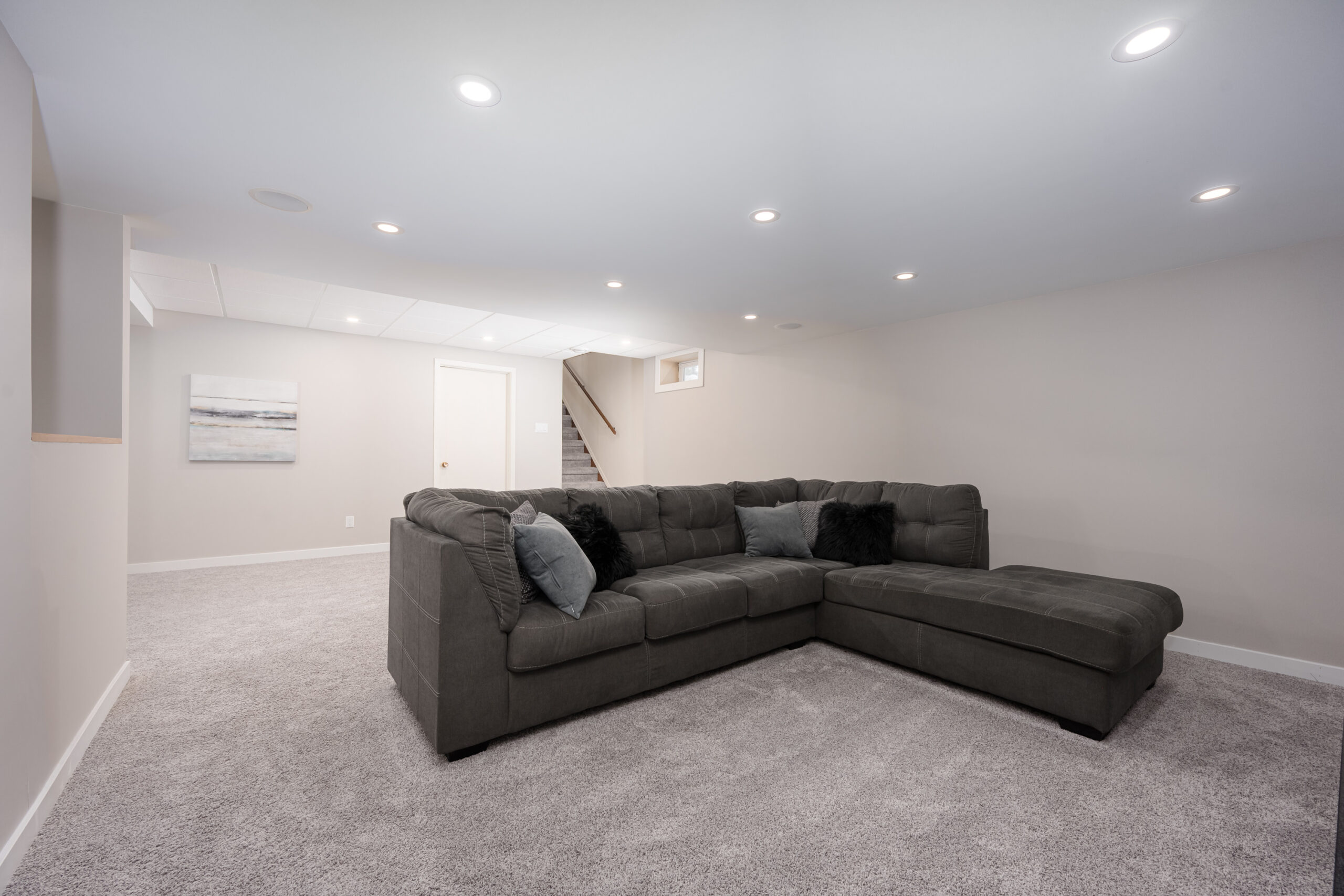Basements can be tricky when it comes to choosing the right carpet. You want something that will look good, last a long time, and not absorb moisture or mildew. But with so many types of carpets available, what’s the best option for basements?
Carpeting a basement can be a great way to liven up a space and provide an extra layer of warmth. But with so many choices available, it can be difficult to determine which type of carpet is best for basements.
In this article, we’ll take a look at the key factors to consider when selecting a carpet for your basement.
Benefits of Carpeting Your Basement
Before choosing the right type of carpet, it’s important to understand the benefits of installing carpet in your basement.
Carpeting your basement provides additional insulation from cold temperatures and also helps reduce noise levels if you have children or pets who tend to be noisy.
Having carpeted flooring also makes a basement look and feel more comfortable and inviting, making it easier to create a cozy living space for family members or guests.
Disadvantages of Carpeting Your Basement
While there are several advantages to carpeting your basement, there are some potential drawbacks as well. Carpeting a basement can be more costly than other flooring options and also requires more maintenance.
The damp, humid conditions in a basement can be hard on carpets and they may need to be replaced more frequently than those that are installed on the main level of a home.
Additionally, carpets can trap dirt, dust mites, pet dander, and other allergens which is why it’s important to have a good vacuuming routine if you choose to install carpet in your basement.
Types of Carpet for Basements

When selecting the type of carpet that is best for your basement, there are several factors to consider. The most important factor is choosing a carpet that can withstand moisture.
Since basements are often prone to humidity and dampness, it’s essential to choose a type of carpet that can handle these conditions without becoming stained or damaged.
Nylon is an excellent choice as it is resistant to moisture and has good stain resistance, durability, and comfort levels. It’s also easy to clean due to its tight fibers, making it ideal for basements with pets or children.
The second factor is choosing a carpet that is the right color and texture for your basement. Darker carpets are often best as they will help hide dirt and stains better than lighter carpets.
Additionally, looped carpets are a good choice since they resist surface stains better than other styles of carpeting. However, textured plush carpets can also work well in basements since their pattern helps disguise any dirt or debris that may accumulate over time.
Installation Considerations
In addition to selecting the type of carpet, it’s important to ensure that the installation process is done properly so that your carpet lasts for years to come. Make sure to use a quality underlayment to provide additional cushioning and protection from moisture.
Using padding will help keep your basement warm in the winter months, and it can also reduce noise levels if you have children or pets who tend to be noisy.
Additionally, make sure that any seams are sealed properly so that moisture cannot leak into them and cause damage.
Costs

The cost of carpet for basements will vary based on the type of carpet you choose as well as the size of your basement.
While carpets with higher-quality materials may cost more upfront, they usually last longer and require less maintenance over time, making them a better investment in the long run.
To get an accurate estimate of how much it will cost to carpet your basement, you should consult with a carpet professional who can give you an accurate quote.
Carpet Padding
Carpet padding is often overlooked when it comes to basement carpeting, but it’s just as important as the type of carpet you choose. The padding adds extra cushioning and protection from moisture buildup, which can damage your floors in the long run.
Make sure to select a quality padding that is specifically designed for basements, and make sure it is installed properly so that it won’t move or become damaged over time.
Remove Humidity from Your Basement
When selecting a carpet for your basement, it’s important to consider the humidity level of the space. High levels of humidity can cause mold and mildew growth, so look for carpets that are resistant to moisture.
If you have poor ventilation in your basement, you may want to invest in a dehumidifier or other moisture control system to keep the air dry.
Style Options
When selecting a carpet for your basement, you should also consider the style options available. If you have children or pets in the house, synthetic fiber carpets may be a better option since they are more resistant to spills and stains.
Berber carpets are another popular choice for basements, as they provide good acoustic insulation and help muffle sound in the space.
Consider different colors and textures to find one that fits your design style and complements your home’s other features.
Best Basement Carpet
Triexta carpet
What is Triexta Carpet?
When it comes to choosing a carpet for your basement, you want something that can withstand the wear and tear of foot traffic as well as temperature and moisture changes.
After all, basements are notoriously damp, and concrete floors can be cold underfoot. That’s why many people opt for Triexta carpet when installing it in their basement.
Triexta is a type of synthetic fiber made from polyester which has been engineered to have superior softness and resilience compared to traditional carpet fibers like nylon or wool.
It’s also naturally stain-resistant, meaning you don’t need to use any chemical treatments on your carpet before installation. This makes Triexta an ideal choice for basements where spills and tracked-in dirt are a common occurrence.
Advantages of Triexta Carpet in Basements
When it comes to carpeting your basement, there are several advantages to choosing Triexta:
Durability – Triexta is highly durable and can handle heavy foot traffic with ease. It’s also resistant to fading, so you don’t need to worry about its color or pattern changing over time.
Comfort – With its soft texture and natural insulation properties, the Triexta carpet will keep your feet comfortable even on cold days. You won’t have to worry about feeling the chill from concrete floors.
Easy Maintenance – Because Triexta is naturally stain-resistant, you won’t need to worry about spills and tracked-in dirt. Just give your carpet a quick vacuum or spot clean as needed and it’ll look like new.
Affordability – Triexta carpets are available at a fraction of the cost of more expensive alternatives like wool or silk carpets, making them an affordable option for budget-conscious homeowners.
Installing Triexta Carpet in Your Basement
Installing Triexta carpet in your basement is relatively straightforward. Make sure to check the manufacturer’s instructions before starting any installation work.
Generally, you’ll need to prepare the subfloor (if necessary), install padding material, and lay the carpet itself. It’s a good idea to hire a professional installer if you’re unsure of how to do any of these tasks safely and correctly.
Once your Triexta carpet is installed, it will be ready to enjoy for many years to come. With its durability and ease of maintenance, it’s an ideal choice for basement carpets that will stand up to everyday wear and tear without requiring too much effort on your part.
So don’t hesitate – choose Triexta for your next basement flooring project!
Related Topics:
Conclusion
When selecting the best type of carpet for your basement, there are many considerations that need to be taken into account.
If you do your research and make sure to select the right style and quality of carpet for your space, you can ensure that your basement is comfortable and inviting for years to come. With proper installation and maintenance, you’ll have a great-looking floor that will last!
By understanding how the different types of carpets perform in a basement environment, you can make an informed decision about which type of carpet is best for your space.
Consider factors such as durability, moisture resistance, and cost when deciding what kind of carpet to use in your basement. With careful consideration, you can select the perfect carpet that will fit both your style and budget!
Additional Tips
- Make sure to vacuum regularly to keep dirt and debris at bay.
- When installing padding or underlayment, make sure it’s sealed properly to prevent moisture from seeping in.
- Test out samples before purchasing so that you know what color and texture is right for your space.
- Make sure to select a high-quality carpet that can stand up to the humidity and moisture of the basement space.
FAQs
Q: What is the most durable type of carpet for a basement?
The most durable type of carpet for a basement is usually Triexta. This type of carpeting is dense and resistant to wear and tear, making it an ideal choice for high-traffic areas like basements.
Q: Is synthetic or natural fiber carpets better suited for basements?
Both synthetic and natural fibers can perform well in basements. However, if moisture resistance is important to you, then synthetic carpets are typically your best bet. Synthetic carpets are also more affordable than many natural fiber options.
Q: How much does it cost to carpet a basement?
The cost of carpeting a basement will vary depending on the type of carpet, the size of the space, and other factors. Generally, you can expect to pay anywhere from $2 to $5 per square foot for materials only.


